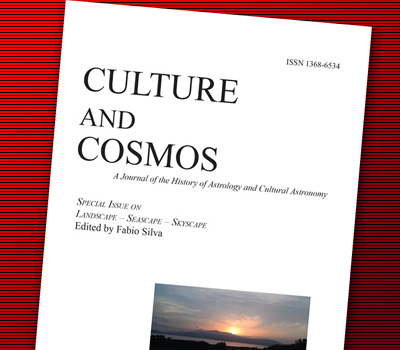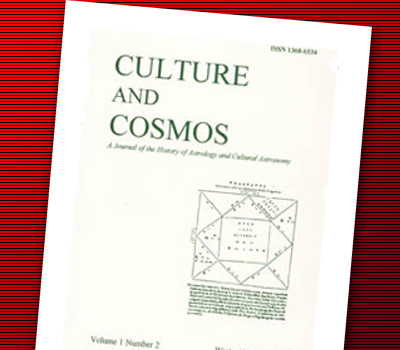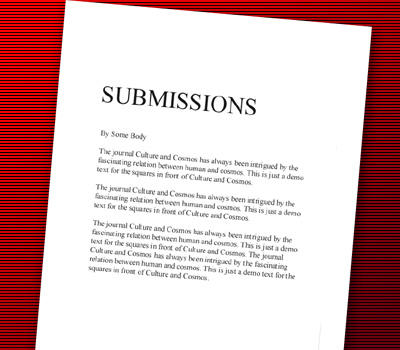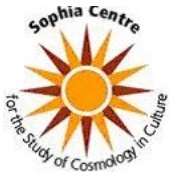We are currently seeking submissions for future volumes of Culture and Cosmos.
Volume 12, No. 2
Book Review
Garry Phillipson
Descents of Memory: The Life of John Cowper Powys, Morine Krissdóttir, Overlook Duckworth, 2007, 480 pages inc 17 pp b/w photographs. 978-1585679171, £25.
This is the first full-length biography of the novelist John Cowper Powys (1872 – 1963). It isn’t possible to get very far, when Powys is involved, before cosmic issues loom, so let us cut to the chase. Morine Krissdóttir writes:
From the beginning, Powys believed that the gods had given him ‘imagination’ which he defined as ‘an actual tapping of some great reservoir of planetary, if not cosmic experience,’ and that this was the… ‘secret’ of the alchemists who were convinced that a magical power dwelt in the human mind… Powys was equally sure that the thing hidden, the ‘secret,’ was both in matter and in the depths of the mind: ‘It is all in nature; and it is all in our individual consciousness.’ (pp.412-3)
For Powys, everything, always, was about the quest to reach an accommodation with an inscrutable cosmos. What one makes of Powys will depend largely on what one makes of that quest. Certainly, it was much more than an intellectual endeavour for him, and his experience of the world seems genuinely to have been animistic. For instance, after turning back short of the peak of Helvellyn ridge (‘like a frightened beast’), he heard his stick calling him ‘recreant’ with every downward step – the stick eventually rejecting him altogether, pitching itself into ‘some mountain tarn’ in an echo of Arthurian myth (p.72). One can’t help but feel that Powys would have made a splendid subject for an anthropologist; a tribe of one with a rich mythological life that seemed to well up spontaneously from his childhood on, assimilating myths from many cultures as it went. Claude Lévi-Strauss suggested that peoples ‘without writing’ invest in myth, which ‘gives man, very importantly, the illusion that he can understand the universe.’ In this view, with the advent of writing, science supplants myth; so it is surely ironic that Powys, who lived so much in words and writing, hated science and embraced myth with passion: ‘…I… regard the magic of the Mabinogion as a nearer approach to the secret of Nature than anything you could learn by vivisecting dogs’ (p.82).
There are many parallels to be drawn between Powys and his near-contemporary, Jung (see the discussion at pp.267-8). Like Jung, Powys took a minor interest in astrology, and references to this are scattered through the book. Looking at the charts for both men, an astrologer might begin by noting that both had Saturn, in rulership, in their first houses: though both delved deeply into the transpersonal, both too held firm to the belief that one should shore up the self against total inundation and dissolution, striving to make of oneself (as Powys put it) ‘a clear-cut, hard, resistant, nucleus of consciousness’ (p.263).
Powys was a bewildering man in whom many contrary qualities – genius and banality, compassion and cruelty, self-understanding and self-delusion – strove to agglomerate well enough to impersonate coherent being. He knew that he ‘gave complete rein to so many manias and aberrations that those who knew me best must often have wondered how far in the direction of a really unbalanced mind I was destined to go’ (p.55). As Krissdóttir remarks, a recurrent question is ‘…whether Powys was an inspired psychologist or a trickster figure who fooled not only the reader but himself’ (p.79). As her book proceeds, you will quite likely find yourself wanting to tick both boxes. Powys certainly wandered in the hinterland of madness at times, a fact he was well aware of. Descents of Memory acquaints the reader with aspects of Powys’s character that were immature, morbid and obsessive. For anyone familiar with his writings, this will probably be a helpful corrective to the impression of the writer as simple unworldly sage which can form, despite Powys’s best efforts regularly to confess his shortcomings.
Another achievement of Krissdóttir’s book is to show how much arcane material lurks just below the surface of the novels. Her detailed analysis of how much mythical grail material lurks in just a few pages of A Glastonbury Romance (p.255-8) will surely take even hardcore Powysians by surprise. The same goes for her treatment of Porius in its original form and her excavation of the seven stages of alchemy which underpin the text (e.g. p.374). The passages of literary analysis here are as revelatory as they are tantalisingly brief, and I found myself wishing that Krissdóttir might write a companion to Powys’s major novels – almost on the scale of Steven Weisenburger’s companion for Gravity’s Rainbow , though a touch less microscopic detail than one finds in that book wouldn’t be a bad thing.
Krissdóttir makes an admirable guide through the labyrinth of Powys’s life. She obviously has developed a deep sympathy for him and his circle, but is bracingly frank about his failures, in life as in literature. Her prose is taut and economical, deeply serious yet spiked with wry humour. It is based on a huge amount of original research and many years of questing to really understand the man. Though not in the least hagiographical, it really illuminates the genius of Powys’s major works. In summary, this is everything a biography should be. It is well over forty years since Powys’s death, but I feel it has been worth waiting for a biography this good, to really do the old fellow justice in the way he would have wanted. When discussing the editing of his brother Llewellyn’s letters, he wrote, ‘…according to my view…we ought in a person’s letters to get the bad as well as the good side of him. Surely we want to get him as closely as possible as he was?’ (p.359). For this reason, and many others, I feel sure that Powys would approve whole-heartedly of Krissdóttir’s book, and be glad that here there is a kind of resolution to his brooding, enigmatic life.
Cf: ‘That [A Glastonbury Romance] has a localized setting at all is an accident of form. Its true setting is the cosmos itself, upon whose vertical axis Glastonbury is but a single if important coordinate; and it is the vertical axis which matters here ultimately.’ David A Cook, ‘John Cowper Powys’ ‘A Glastonbury Romance’: A Modern Mystery Play’, Contemporary Literature, Vol. 13, No. 3. (Summer, 1972), p. 341.
Whilst researching the book, Krissdóttir found Powys’s time of birth, written in his father’s pocket book. It is: 1.25 pm (8th October 1872, Ashbourne, Derbyshire).









